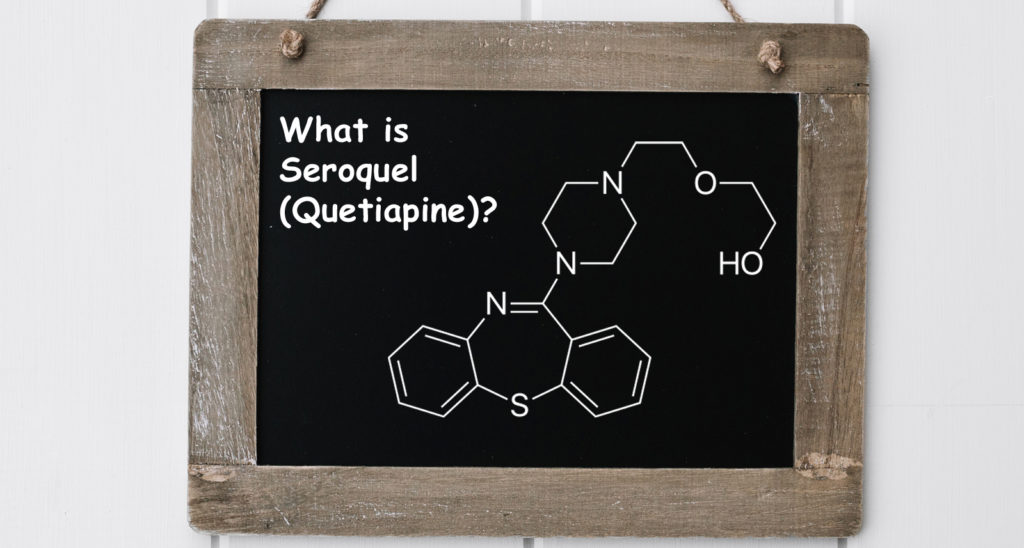Is a family member taking Seroquel? Perhaps you are wondering, what is Seroquel? Seroquel is the common name for an anti-psychotic drug that is referred to medically as quetiapine fumarate. It is frequently prescribed to patients suffering from bipolar disorder, bipolar mania, and schizophrenia. It is also commonly prescribed for other conditions such as insomnia or anxiety. Patients who have never been prescribed this drug should always consult their physicians regarding proper use, dosage, side effects, and the potential for addiction before beginning treatment. They can, however, find some introductory information below that may help them learn more about its uses and effects.
How Seroquel works
Many patients’ first response to their doctors’ suggestions that they begin a regimen of quetiapine is to ask, “What is Seroquel?” Simply put, it is an atypical type anti-psychotic medication that works by restoring the balance of certain neurotransmitters in a patient’s brain to decrease hallucinations, nervousness, and paranoia while improving sleep, appetite, mood, and energy. It can also help to decrease the frequency and severity of mood swings in patients suffering from bipolar depression.
How Seroquel is taken
Seroquel is taken orally one to three times per day depending on the patient’s needs. It is available in both immediate release and extended release formats. When it is used to treat bipolar depression, it is usually taken right before bedtime. Dosage will depend on the patient’s medical condition, his or her response to treatment, and what other medications are being taken, but dosage instructions should always be followed carefully as it is possible to get addicted to Seroquel.
Is Seroquel addictive?
According to the National Alliance on Mental Illness, as long as it is used exactly as prescribed, Seroquel is not addictive. The key here is “as prescribed.” Individuals who self-medicate or take more than prescribed are at risk of addiction. While Seroquel is not considered by the medical establishment to be physically addictive, the rebound effect from stopping can cause the symptoms of an underlying mental disorder to reappear. This can be extremely uncomfortable. The drug leaves the body within 36 hours, but the withdrawal symptoms can continue for much longer, as long as several months.
Seroquel abuse
Seroquel is a strong sedative that is sometimes used to control prisoners and children within the juvenile justice system. While some people abuse Seroquel alone, it is more commonly used in combination with cocaine or heroin to prevent manic episodes. Reports have surfaced where abusers crush and snort the tablets. When mixed with cocaine, it may be called a Q-ball. Other street names include Quell, Snozberries, Baby Heroin, and Suzie-Q. The Office of Alcoholism and Substance Abuse Services (OASAS) reports that individuals who choose to abuse quetiapine fumarate do so for its relaxation effects. However, even those not addicted may experience unpleasant side effects or uncomfortable withdrawal symptoms.
Side Effects
There are several common side effects reported by patients taking Seroquel. Side effects include constipation, drowsiness, weight gain, dry mouth, blurred vision, upset stomach, and tiredness. These effects are generally mild. More serious side effects include restlessness, tremors, mood changes, difficulty swallowing, interrupted breathing during sleep, yellowing skin and eyes, problems urinating, and loss of appetite. If you experience these more serious issues you should call your doctor immediately. In extremely rare cases, Seroquel may cause extreme conditions such as tardive dyskinesia, neuroleptic malignant syndrome, symptoms of infection, and kidney problems. It may also increase the amount of prolactin produced by the body and may affect fertility rates. Those who are already at high risk for heart disease or have high blood sugar should carefully consider the benefits and risks of Seroquel before starting to take it, as it may increase the risk of developing this serious health condition.
Overdose Symptoms
It is undeniably possible to overdose on Seroquel. Symptoms of an overdose include dizziness, an increased heart rate, decreased blood pressure, passing out, and trouble with breathing. An overdose is a medical emergency. If you suspect an overdose, seek immediate emergency assistance. An overdose may be more likely to occur if patients are suffering from quetiapine addiction and are not taking their medications as prescribed.
Symptoms of withdrawal
Given that Seroquel is one of the more popular antipsychotic medications and is used to treat serious mental health problems that occur due to chemical imbalances in the brain, it should be unsurprising that abruptly halting it can cause mood and mental changes. Seroquel leaves the body in three days, but the symptoms of withdrawal can last much longer. Those who are taking Seroquel should be placed under close observation both while they are taking it and when they stop, especially if they are schizophrenic or manic depressed, as they may become psychotic or even suicidal. Physical withdrawal symptoms may come up as well, including potentially severe gastrointestinal symptoms and neurological symptoms.
The takeaway
Seroquel has been proven to be effective at treating severe mental and mood disorders. However, it is very important that patients keep in direct contact with their prescribing physicians throughout treatment. They must remain cognizant of the benefits and risks of taking this and other prescription drugs, especially if they plan on becoming pregnant. The effects of stopping Seroquel can be significant. Those who have been taking Seroquel long term should always be weaned off the drug under medical supervision. A slow weaning off lessens withdrawal issues. Anyone who believes that he or she may be developing an addiction to Seroquel should contact a doctor or addiction specialist immediately. For more information contact us today.


